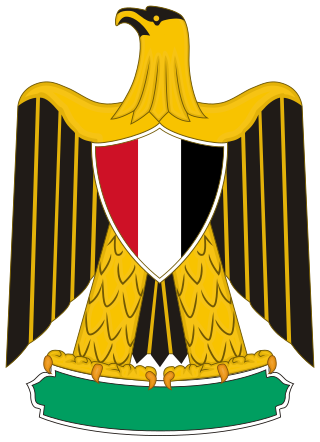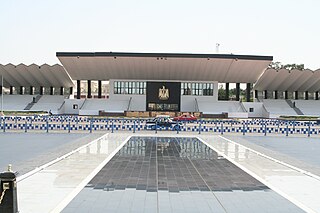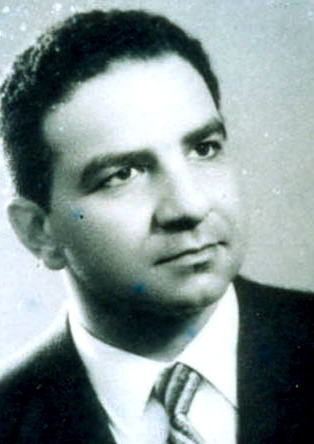
Muhammad Anwar el-Sadat was an Egyptian politician and military officer who served as the third president of Egypt, from 15 October 1970 until his assassination by fundamentalist army officers on 6 October 1981. Sadat was a senior member of the Free Officers who overthrew King Farouk in the Egyptian Revolution of 1952, and a close confidant of President Gamal Abdel Nasser, under whom he served as Vice President twice and whom he succeeded as president in 1970. In 1978, Sadat and Menachem Begin, Prime Minister of Israel, signed a peace treaty in cooperation with United States President Jimmy Carter, for which they were recognized with the Nobel Peace Prize.
According to most scholars the history of modern Egypt dates from the start of the rule of Muhammad Ali'v in 1805 and his launching of Egypt's modernization project that involved building a new army and suggesting a new map for the country, though the definition of Egypt's modern history has varied in accordance with different definitions of modernity. Some scholars date it as far back as 1516 with the Ottomans' defeat of the Mamlūks in 1516–17.

Mohamed Hassanein Heikal was an Egyptian journalist. For 17 years (1957–1974), he was editor-in-chief of the Cairo newspaper Al-Ahram and was a commentator on Arab affairs for more than 50 years.

Infitah or Law 43 of 1974 was Egyptian President Anwar Sadat's policy of "opening the door" to private investment in Egypt in the years following the 1973 October War with Israel. Infitah was accompanied by a break with longtime ally and aid-giver the USSR – which was replaced by the United States – and by a peace process with Israel symbolized by Sadat's dramatic flight to Jerusalem in 1977. Infitah ended the domination of Egypt's economy by the public sector and encouraged both domestic and foreign investment in the private sector. The Egyptian Army's crossing across the Suez canal in the October 1973 Yom Kippur War, which, despite Egypt's eventual defeat, was seen by many as a political victory for its initial successes and gave Sadat the prestige to initiate a major reversal of Gamal Abdel Nasser's policies.

Nasserism is an Arab nationalist and Arab socialist political ideology based on the thinking of Gamal Abdel Nasser, one of the two principal leaders of the Egyptian Revolution of 1952, and Egypt's second President. Spanning the domestic and international spheres, it combines elements of Arab socialism, republicanism, nationalism, anti-imperialism, developing world solidarity, Pan-Arabism, and international non-alignment. According to Mohamed Hassanein Heikal, Nasserism symbolised "the direction of liberation, socialist transformation, the people’s control of their own resources, and the democracy of the peoples working forces."

Hassan Mohammed Allam was one of the pioneers of modern construction in Egypt.

Egypt and the United States formally began relations in 1922 after Egypt gained nominal independence from the United Kingdom. Relations between both countries have largely been dictated by regional issues in the Middle East such as the Israeli–Palestinian conflict and Counterterrorism. But also domestic issues in Egypt regarding the country's human rights record and American support for the regimes of Hosni Mubarak and Abdel Fattah el-Sisi which the United States had come under controversy for in the aftermath of the 2011 Egyptian Revolution, and with many dissents of the current regime describing Sisi's rule as tyrannical.

The Egyptian "bread riots" of 1977 were a spontaneous uprising against the increase in commodities' prices on the 18th and 19th of January after the Egyptian government cut subsidies for basic foodstuff.

Sadat is a 1983 American two-part, four-hour made-for-television biographical film based on the life and death of the late 3rd President of Egypt, Anwar Sadat, starring Louis Gossett Jr. as Sadat and Madolyn Smith as Sadat's wife, Jehan. It was distributed by Columbia Pictures Television through Operation Prime Time. Gossett's performance earned him a nomination for an Emmy Award and a Golden Globe Award.
The History of Republican Egypt spans the period of modern Egyptian history from the Egyptian Revolution of 1952 to the present day, which saw the toppling of the monarchy of Egypt and Sudan, the establishment of a presidential republic, and a period of profound economic, and political change in Egypt, and throughout the Arab world. The abolition of a monarchy and aristocracy viewed widely as sympathetic to Western interests, particularly since the ousting of Khedive Isma'il Pasha, over seven decades earlier, helped strengthen the authentically Egyptian character of the republic in the eyes of its supporters.

Abdel Latif Boghdadi or Abd el-Latif el-Baghdadi was an Egyptian politician, senior air force officer, and judge. An original member of the Free Officers Movement which overthrew the monarchy in Egypt in the 1952 Revolution, Boghdadi later served as Gamal Abdel Nasser's vice president. The French author Jean Lacouture called Boghdadi "a robust manager" who only lacked "stature comparable to Nasser's." The two leaders had a falling out over Nasser's increasingly socialist and pro-USSR policies and Boghdadi subsequently withdrew from political life in 1964, although he mended ties with Nasser before the latter's death in 1970.
The Arab Cold War was a political rivalry in the Arab world from the early 1950s to the late 1970s as part of the broader Cold War. The generally accepted beginning of the Arab Cold War was the Egyptian revolution of 1952, which ultimately led to Gamal Abdel Nasser becoming President of Egypt in 1956. Thereafter, newly established Arab republics defined by revolutionary secular nationalism, and largely drawing inspiration from Nasser's Egypt, were engaged in political rivalries of varying degrees of ferocity with conservative traditionalist Arab monarchies, led chiefly by Saudi Arabia. The approximate end point of this period of internecine rivalry and conflict is generally viewed as being the 1979 Iranian Revolution, which culminated in the installation of Ayatollah Ruhollah Khomeini as the leader of Iran's theocratic government. Subsequently, the bitterness of intra-Arab strife was eclipsed by a new era of Arab-Iranian tensions.

Anwar Sadat, the 3rd President of Egypt, was assassinated on 6 October 1981 during the annual victory parade held in Cairo to celebrate Operation Badr, during which the Egyptian Army had crossed the Suez Canal and taken back a small part of the Sinai Peninsula from Israel at the beginning of the Yom Kippur War. The assassination was undertaken by members of the Egyptian Islamic Jihad.
The Arab Socialist Union was an Egyptian political party based on the principles of Nasserist Arab socialism.
Egypt's first experience of secularism started with the British Occupation (1882–1952), the atmosphere which allowed the protection of debate. In this environment pro-secularist intellectuals like Yaqub Sarruf, Faris Nimr, Nicola Haddad who sought political asylum from Ottoman Rule were able to publish their work. This debate had then become a burning issue with the work of Egyptian Shaykh Ali Abdel Raziq (1888–1966), “The most momentous document in the crucial intellectual and religious debate of modern Islamic history”.

The history of Egypt under Anwar Sadat covers the eleven year period of Egyptian history from Anwar Sadat's election as President of Egypt on 15 October 1970, following the death of President Gamal Abdel Nasser, to Sadat's assassination by Islamist fundamentalist army officers on 6 October 1981. Though presenting himself as a Nasserist during his predecessor's lifetime, upon becoming President, Sadat broke with many of the core tenets of the domestic and foreign policy ideology that had defined Egyptian politics since the Egyptian Revolution of 1952. In addition to abandoning many of Nasser's economic and political principles via the Infitah policy, Sadat ended Egypt's strategic partnership with the Soviet Union in favor of a new strategic relationship with the United States, initiated the peace process with the State of Israel in exchange for the evacuation of all Israeli military forces and settlers from Egyptian territory, and instituted a form of politics in Egypt that, whilst far removed from Egypt's pre-revolution democratic system, allowed for some multi-party representation in Egyptian politics. Sadat's tenure also witnessed a rise in governmental corruption, and a widening of the gulf between rich and poor, both of which would become hallmarks of the presidency of his successor, Hosni Mubarak.

Egyptian nationalism is based on Egyptians and Egyptian culture. Egyptian nationalism has typically been a civic nationalism that has emphasized the unity of Egyptians regardless of their ethnicity or religion. Egyptian nationalism first manifested itself as Anti-English sentiment during the Egyptian revolution of 1919.
Al Tali'a was a monthly Marxist magazine which was based in Cairo, Egypt. It was in circulation between 1965 and 1977.

Sharawi Gomaa (1920–1988) was an Egyptian military officer who served in various posts, including governor of Suez, deputy prime minister and minister of interior, during the presidency of Gamal Abdel Nasser. He was part of the May Group who were removed from the office by Anwar Sadat in May 1971.

Sami Sharaf was an Egyptian military officer who held various posts during the presidency of Gamal Abdel Nasser. His public roles ended in May 1971 when he was arrested and then imprisoned by the Egyptian authorities under the presidency of Anwar Sadat.












